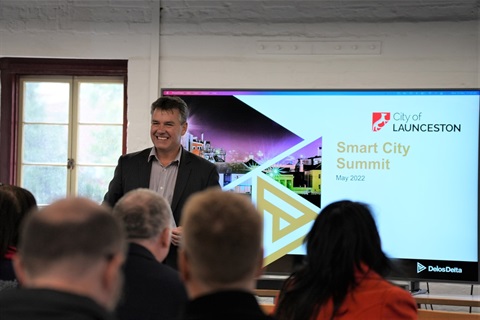Feedback wanted on Smart City Strategy
Published on 18 May 2022

The City of Launceston is seeking community feedback to develop a Smart City Strategy, which aims to guide the implementation of future technology, data and innovation projects in Launceston.
The development of a Smart City Strategy seeks to provide a strategic direction for the roll-out of new technologies to make Launceston more accessible, sustainable, and mobile.
COMPLETE THE SURVEY HERE
Launceston Mayor Albert van Zetten said the strategy would consider a range of technologies, including smart sensors, open data, internet connectivity, electric vehicle chargers and more.
"What we've found in recent years is there has been a paradigm shift in terms of the technologies now available to local government that allow us to redefine the way we deliver services to our community," Mayor van Zetten said.
"There are enormous opportunities through technologies like smart sensors to gain a real-time understanding of how people are using our city, whether it's the number of joggers using a certain trail, what times of day people prefer to visit our parks, or having access to up-to-the-minute data in emergency management scenarios.
"And that's important in the local government sector where our focus is on delivering services to residents.
"A simple example of how smart technology might be used by the City of Launceston in future is if we have sensors that can tell us people are more likely to visit one of our sports fields at 4pm on a Tuesday, that might change when we undertake maintenance on that field, or when we empty the rubbish bins, or turn on the sprinklers."
City of Launceston Strategy, Economic Development and Analytics Team Leader Jarred Ranson said the City of Launceston had already developed a solid foundation of smart city projects in recent years, including the development of the State's largest free public Wi-Fi Network, the development of 3D computer models of the city, and the roll-out of a dedicated Council-owned fibre-optic network.
"We now have a range of smart sensors across the city which can provide us real-time information on water levels in our river systems, pedestrian movement in our CBD, weather information, and even traffic noise levels on some of our CBD streets," Mr Ranson said.
"But these technologies are only a drop in the bucket compared to what is expected to become more commonplace in coming years. How local councils like the City of Launceston use these emerging technologies to improve services in a strategic and coordinated way is a question we are considering in order to develop a dedicated Smart City Strategy."
Launceston residents are invited to take part in a short online survey, with feedback closing on Tuesday, May 31.